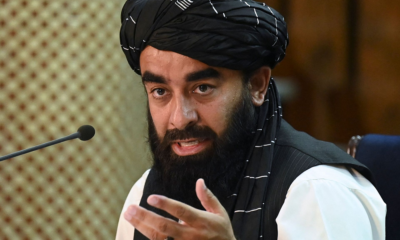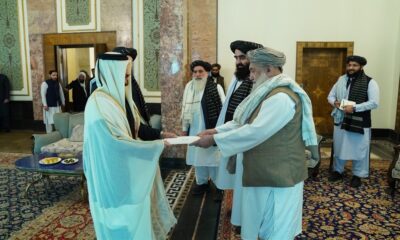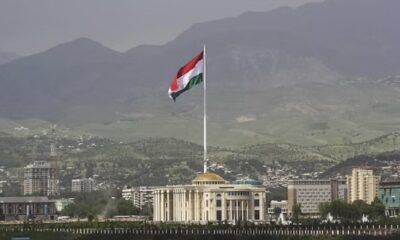Latest News
There Is No Military Solution to the Situation in Afghanistan: US Official
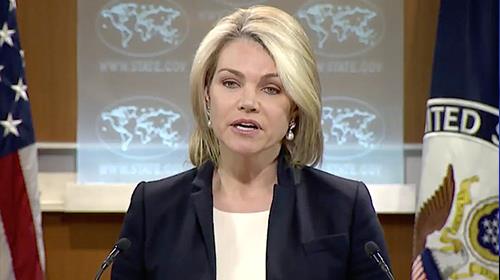
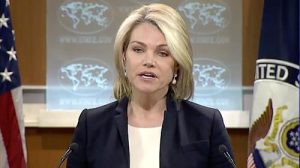 The U.S. State Department on Tuesday said there is no military solution to the situation in Afghanistan and ultimately there has to be a political solution.
The U.S. State Department on Tuesday said there is no military solution to the situation in Afghanistan and ultimately there has to be a political solution.
“Ultimately, we don’t see there being a military solution to the situation in Afghanistan. Ultimately, it has to be a political situation,” State Department Spokeswoman, Heather Nauert told reporters.
She called the Kabul Process Conference an initiative by Afghan government that tries “to bring together different international partners to coordinate international efforts to support Afghanistan’s pursuit of peace”.
On Wednesday, President Ashraf Ghani offered unconditional peace talks to the Taliban. Recognizing the group as a legitimate political party and offering them an office in Kabul were among the suggestions to the insurgent group.
But the U.S. official said the Taliban at this point of time does not seem to be ready for peace talks.
“The Taliban, unfortunately, does not seem ready at this point to sit down and have conversations about peace talks,” Nauert said.
She said they have seen the Taliban letter to the U.S., asserting that any peace talks with Afghanistan have to be Afghan-led and Afghan-owned.
The U.S. official further added that if the Taliban was willing to sit down and have talks with Afghan government, the US could have a role in that.
Meanwhile, U.S. Gen. Joseph L Votel, commander of U.S. Central Command, testified before the House Armed Services Committee said any success in Afghanistan will require a strong relationship with Pakistan.
He said the United States has tried to be very clear in terms of what Pakistan needs to do for Washington and that it must be “a two-way street”.
Votel told the House that the big idea in Afghanistan is a “drive toward reconciliation” to get the Taliban to the negotiation table.
Latest News
Afghanistan makes major strides in cutting drug trafficking, says Putin
Putin stated that Afghan authorities have “substantially reduced” opium cultivation and are “seriously confronting” drug-related threats from within their borders.

Russian President Vladimir Putin says Afghanistan has taken “active and effective” steps to curb drug trafficking, noting a significant drop in opium production across the country. He made the remarks during an exclusive interview with India Today during his India trip, highlighting what he described as “visible progress” in Afghanistan’s internal security efforts.
Putin stated that Afghan authorities have “substantially reduced” opium cultivation and are “seriously confronting” drug-related threats from within their borders. He added that Afghanistan has also made important advancements in the fight against terrorism.
Responding to a question about why Russia officially recognized the Islamic Emirate, the Russian president said Afghanistan had been engulfed in civil conflict for many years, but the current authorities now hold control over the country. “This is the reality, and it must be acknowledged,” Putin emphasized.
He further noted that maintaining contact with Afghanistan’s leadership is crucial for shaping events inside the country. “If you want influence, you must engage with the people in charge — and that is exactly what we are doing,” he said.
Putin’s remarks come as several regional powers continue to recalibrate their diplomatic strategies toward Afghanistan, focusing on stability, counterterrorism, and economic cooperation.
Latest News
Iran offers fully funded virtual education for Afghan students returning from abroad
Nader Yarahmadi, head of the Center for Foreign Nationals and Refugees at Iran’s Ministry of Interior, said Tehran is ready to deliver online education to Afghan students inside Afghanistan

Iran has announced that it is prepared to provide fully funded virtual education for Afghan students returning from abroad, including complete support for digital learning tools and equipment.
Nader Yarahmadi, head of the Center for Foreign Nationals and Refugees at Iran’s Ministry of Interior, said Tehran is ready to deliver online education to Afghan students inside Afghanistan, adding that an international partner has expressed interest in helping finance the initiative.
According to Yarahmadi, more than 6.1 million Afghan nationals are legally residing in Iran, with only about 33,000 living in camps and the remainder settled in cities. He noted that until last year, Afghan students made up roughly 12% of Afghanistan’s residents in Iran and accounted for nearly 16% of Iran’s total student population. He said expanding school infrastructure and improving educational quality would help close existing gaps.
Iran’s Education Minister Alireza Kazemi highlighted the country’s experience with remote learning through the “Shad” platform during the COVID-19 pandemic. “We are ready to educate all Afghan students through our national education network under a tripartite cooperation agreement, granting them valid academic certificates within the virtual school framework,” he said.
Earlier meetings in Kabul between Iran’s Ambassador to Afghanistan, Alireza Bigdeli, Cultural Attaché Seyed Ruhollah Hosseini, and Islamic Emirate education officials underscored both sides’ interest in continuing cooperation in the education sector.
Latest News
India sends over 63,000 vaccine doses to boost Afghanistan’s public health system
New Delhi has reiterated that it remains committed to supporting the Afghan people through sustained humanitarian and medical assistance.
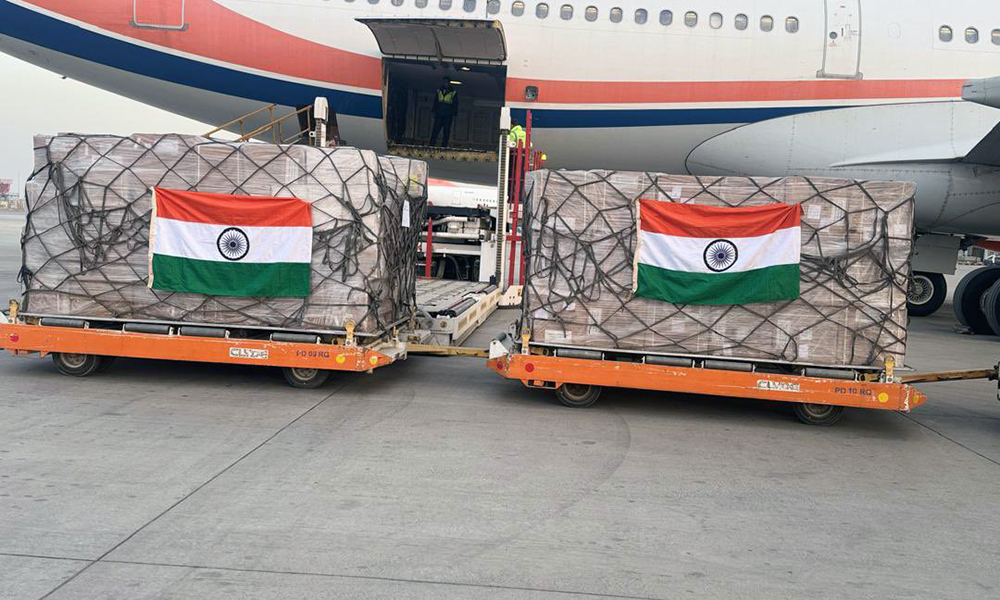
India has reinforced its support for Afghanistan’s public health sector with the delivery of a new batch of essential vaccines to Kabul.
Ministry of External Affairs spokesperson Randhir Jaiswal said New Delhi has supplied 63,734 doses of influenza and meningitis vaccines to Afghan health authorities as part of its ongoing humanitarian assistance program.
Afghan health officials noted that the vaccines will be integrated into national preventive healthcare efforts and will help curb seasonal illnesses while reducing the risk of meningitis outbreaks, especially during periods of heightened vulnerability.
They said the shipment arrives at a time when Afghanistan’s medical resources remain under significant strain.
India has served as a key health partner to Afghanistan in recent years, providing medical supplies, essential medicines, and several rounds of vaccines to help strengthen the country’s healthcare infrastructure.
New Delhi has reiterated that it remains committed to supporting the Afghan people through sustained humanitarian and medical assistance.
-

 Latest News5 days ago
Latest News5 days agoPakistan says planned military action against Afghanistan was halted at Qatar’s request
-
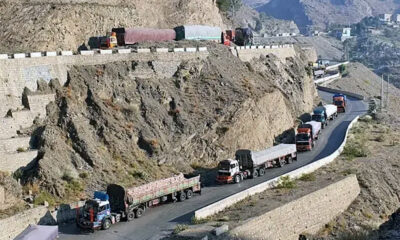
 Business5 days ago
Business5 days agoAfghan-Pakistani land port closures strangle import-export trade sector
-
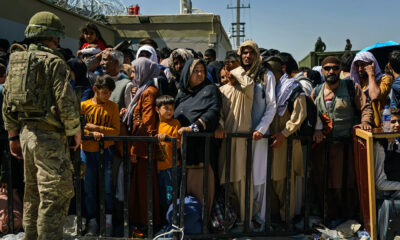
 Latest News5 days ago
Latest News5 days agoThousands of Afghan evacuees flagged for security concerns in US since 2021
-

 Sport5 days ago
Sport5 days agoAfghanistan U19 and India A U19 share tri-series trophy after final washed out
-

 International Sports3 days ago
International Sports3 days agoStar-studded squads set to ignite DP World ILT20 Season 4
-
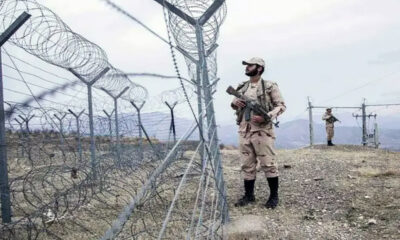
 Latest News3 days ago
Latest News3 days ago10 Afghans killed in Farah border shooting by Iranian forces
-

 Sport5 days ago
Sport5 days agoQuetta Qavalry to face UAE Bulls in Abu Dhabi T10 qualifier 2
-

 Sport4 days ago
Sport4 days agoAfghanistan deepens ties with Uzbekistan through new cricket development partnership


